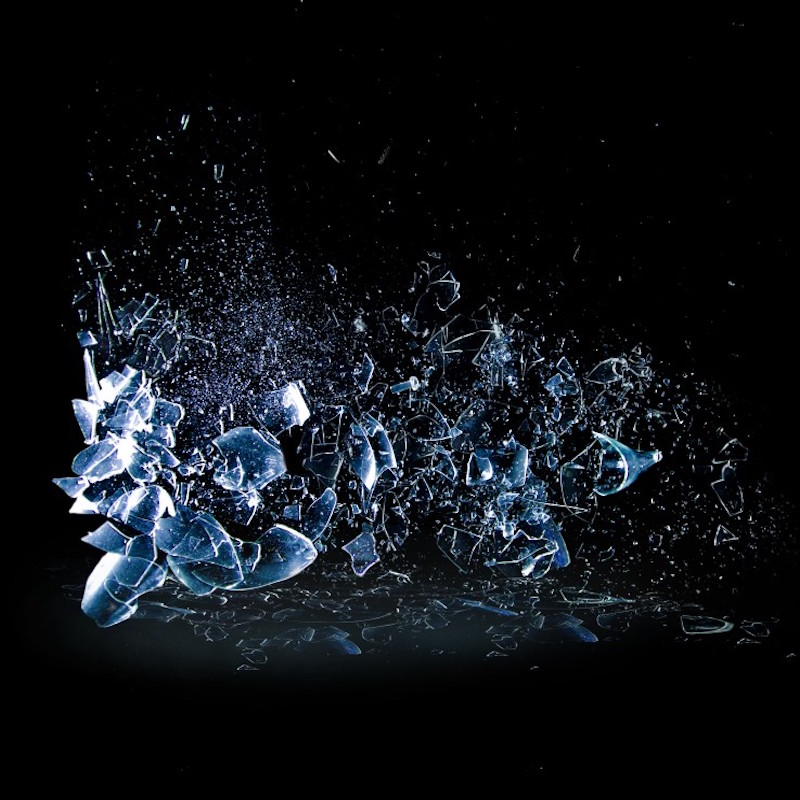Earlier this year, New Jersey quintet The Dillinger Escape Plan announced that their sixth studio album, Dissociation, would also be their last. After a European tour to support the record in 2017, the band will go on indefinite hiatus.
But what can we expect from their final release?
“Making this record was hard because we started from a very disadvantaged place,” says lead guitarist Ben Weinman. “We weren’t in a studio we’d ever worked in before and we weren’t with our typical producer [Steve Evetts]. I was kind of plugging through the drums with our drummer and just an engineer, trying to be objective and pull as much out of them as possible. Then we started doing guitars in a different studio with our producer that we’ve worked with in the past, and he wasn’t used to the drums because it wasn’t his stuff. And we were recording in the middle of the night; we’d start at 9pm and work right through until 9am. So it was horrible. I felt like a zombie. I was confused as shit and I was having delusions, and I think that made some crazy head space and affected the music, for sure. Then when all the music was mixed Greg started recording vocals in another studio on a different coast.”
“We did drums in New York, guitars and bass in New Jersey, and I did half the vocals in one studio in California with one producer and then I went to a different producer in a different studio and finished the vocals there,” adds vocalist Greg Puciato. “And whilst I was recording the vocals we had Kurt Ballou [Converge] mix the music. Then after I’d finished the vocals we had a different producer mix the vocals in with the music. Any normal producer or engineer will tell you, ‘That is not how you make a record.’ You would never make those choices. No one in their sane mind would choose to do that. So this is definitely an album that you could never pinpoint how it sounds exactly the way it sounds; we did so much technically incorrect to get to the final conclusion. But I think that adds to the record.”
Here, then, is Ben and Greg’s track-by-track guide to Dissociation.

Limerent Death
Weinman: “I don’t think we’ve ever written a song where I was so excited to play it live immediately. When we were working on this one it made me feel like I wanted to destroy the fucking place. It would always pull me out of a funk and exercise something from me. And when Greg completed it he took it to the next level and gave it even more meaning. It’s one of my favourite Dillinger songs ever, and it’s so therapeutic to play.”
Puciato: “I agree. When I first heard this song I knew it was going to be a scorcher. I knew the end line, which is a repeating line that happens for about a minute and a half, was going to be powerful. It gives me chills to play it. Something some people might find interesting if they’re singers is that the entire end part is one take, first take. That was something that was important to me because I wanted it to ramp up in intensity in a very natural way. I wanted to capture the feeling of somebody escalating into an impossible frenzy. It’s one of my favourite vocal performances ever and I think the whole song in general is a pretty awesome capsule of The Dillinger Escape Plan.”
Symptom of Terminal Illness
Puciato: “The whole record is pretty dark and this is definitely one of the darker songs on there. The lyrics reference panic attacks and panic disorder, which I’ve had a little bit of experience with. It’s the most literal and non-metaphoric or abstract thing I’ve ever written. It’s already incredibly bizarre to have the song exist in the first place, so to go even deeper and talk about it would mean that I have to talk about my personal life and that’s just not something I’m willing to do.”
Weinman: “Throughout the years some of the challenges for us have been to incorporate more melodic and typical song structure into our catalogue with it still being Dillinger. But the longer we’ve been a band the more I’ve realised it’s unavoidable for us to still be Dillinger. That’s just who we are; I do weird note choices and Billy [Rymer] is influenced by gospel and jazz-fusion drummers. It’s always going to be interesting and twisted and it’s always interesting to see how the music hits Greg.”
Wanting Not So Much To As To
Weinman: “There’s a riff in this song that I was trying to summon my inner-1987 Hetfield so badly for. It’s super Ride The Lightning. I remember my hand burning as I tried to stay on the tracks playing it. It was really challenging to deliver it in the way that it needed to be delivered.”
Puciato: “I think this is one of the songs from our entire history in which you can really hear the personality of Ben’s guitar playing, particularly in the opening part but also again in the middle. It’s just so bizarre. His musical personality is really on full display.”
- Why have Dillinger Escape Plan really decided to call it quits?
- The Black Queen: Fever Daydream
- Giraffe Tongue Orchestra album review – Broken Lines
- Everything you need to know about Party Smasher Inc
FUGUE
Puciato: “FUGUE relates to the record title Dissociation. It’s almost like a form of temporary amnesia. It’s a dissociative state kind of like temporary insanity, but more like temporary detachment or depersonalisation, where you’re unaware of who you are.”
Weinman: “Greg named the song but it really shows how closely tied we are, creatively. It’s something that I wrote many years ago and writing it was like meditation for me. It wasn’t something I even intended to release. I’d just sit and work on it to calm me down and get rid of all the thoughts that I was worrying about. Music is my form of meditation and this song was my way of getting out of my own mind, so it’s really interesting that Greg took the lyrics in that direction without even knowing that.”
Low Feels Blvd
Weinman: “This is an interesting song for me because it represents in some ways the classic Dillinger vocabulary. I don’t want to say ‘stock Dillinger’, but it is that in a way. It’s got typical Dillinger riffs, but then it breaks into these crazy lush harmonies and almost Mahavishnu guitar lines. All the solos were improvised – I didn’t write any of them ahead of time. We had this guy come and play violin on it as well, and he actually learned the solo that I played and mimicked it. Then we had a horn guy come in and play what sounded like the Tin Man song from Wizard of Oz, and those notes fitted really well with what was going on with the chords. A lot of people might not hear that but I hear it every time, and it’s cool because free jazz is about touching on these themes and just fucking destroying them.”
Puciato: “That just reminded me…just to throw back to Limerent Death real quick; there’s a glass break sound in that song that was then the inspiration for all the artwork, which I art directed and Ben executed. Our hands really were over every single element of this album.”

Surrogate
Puciato: “This is another one of my favourite songs on the record. There’s so much cool stuff and interesting production in it. There’s like a whispery bit that was inspired by The Cure song Lullaby. It’s a really intimate vocal. And the bridge in this song, lyrically and delivery wise, is more raw than any screaming could possibly be. It’s as intense to me as anything I’ve ever done.”
Honeysuckle
Weinman: “This is another quintessential Dillinger song. It’s super dense and there are a ton of personalities happening all over the place. It’s schizophrenic and aggressive, and the down-tune into the final breakdown at the end of the song is really cool.”
Puciato: “I got really frustrated whilst I was recording the vocals for this one. In between takes the door to the vocal booth was open and I slammed it really fucking hard. I didn’t realise that the producer was rolling, but he was and he captured this really cool sound, which you can hear in that breakdown towards the end of the song. It kind of sounds like there’s another kick drum on top of it or something.”
Weinman: “This song almost has like a hip-hop groove over all these crazy rhythms, and something we’ve really tried to do with the last few albums is insert pocket and feeling into our rhythms.”

Manufacturing Discontent
Weinman: “This was the first song that we intentionally wrote for this album. Our drummer Billy hated it to begin with, but I was like, ‘Trust me. It’s cool.’ Then he ended up really liking it. It’s just one of those things; sometimes you just have to trust the process.”
Puciato: “This song has a weird vocal part at the end of it, too. It almost sounds like something from The Rocky Horror Picture Show.”
Apologies Not Included
Weinman: “This song has one of the weirdest and hardest rhythms in Dillinger history. It almost sounds like a game show. That’s the thing I remember most about that one.”

Nothing To Forget
Weinman: “Nothing To Forget sounds like the best Faith No More song we ever wrote. Maybe even the best Faith No More song they neverwrote. I felt like it was a pitch that Greg could really hit because it left space, and it was dark and it had personality. It was one of those songs, like Milk Lizard, that just came really easy. We just got in a room and made it happen.”
Dissociation
Weinman: “This song was written many years ago. I didn’t actually know if we would ever use it. Originally it was constructed over this little drum loop that Zach Hill [Death Grips/Hella] gave me. He just played this loop into a recorder and I took it and made a song out of it. But it wasn’t until now that we felt like it had a place in Dillinger. So it’s the last song on the album, but it’s a song that’s many years old, and I don’t know what people will take from that.”
Puciato: “It might be my favourite vocal performance on any Dillinger song ever. The verse melody is one I’ve had since I was 19, that I never did anything with. It just happened to line up with these key changes so I never forgot it. So that’s interesting as well. Everything feels like it’s come full circle.”
Weinman: “Full maturity is to get to a point where you stop blaming everybody else for everything you have or haven’t done, and you start to really look inside and take responsibility. When you get to that level where you can have objectivity on yourself and you start to think about what you can do to actually create your own destiny, that’s when you’ve matured. I think that’s representative of this song and vocal melody being super old and not having a place until now. We wanted to end the record with this statement that we get it now, and we’re ready to move on. We’ve grown up. And we’re done with this chapter.”
The Dillinger Escape Plan’s album Dissociation is out now. The band are currently on tour.

